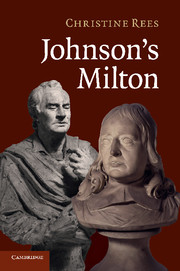Book contents
- Frontmatter
- Contents
- Acknowledgements
- List of abbreviations
- Introduction: Johnson and Milton
- PART I JOHNSON THE READER/WRITER: APPROPRIATING MILTON'S TEXTS
- PART II JOHNSON THE CRITIC: ASSESSING MILTON'S ACHIEVEMENT
- PART III JOHNSON THE BIOGRAPHER: CONSTRUCTING MILTON'S CHARACTER
- Notes
- Select bibliography
- Index
Introduction: Johnson and Milton
Published online by Cambridge University Press: 05 October 2010
- Frontmatter
- Contents
- Acknowledgements
- List of abbreviations
- Introduction: Johnson and Milton
- PART I JOHNSON THE READER/WRITER: APPROPRIATING MILTON'S TEXTS
- PART II JOHNSON THE CRITIC: ASSESSING MILTON'S ACHIEVEMENT
- PART III JOHNSON THE BIOGRAPHER: CONSTRUCTING MILTON'S CHARACTER
- Notes
- Select bibliography
- Index
Summary
‘“Milton, Madam, was a genius that could cut a Colossus from a rock; but could not carve heads upon cherry-stones”’ (Life IV. p. 305). Johnson's metaphor might apply to the range of his own creative engagement with Milton's work over his career, from the cherry-stones of scattered allusion, comment, and quotation, to the Colossi: the Dictionary, the criticism, the biography. Whatever the scale, he brings the shaping tools of intellect and imagination to a body of material that continues to resist and challenge him. It is impossible for him to ignore an English poet who not only justifies himself to posterity, and before the tribunal of the ancients, but who also claims to justify the ways of God to men.
It should also be impossible for readers of either Milton or Johnson (or both) to ignore the confrontation of two of the most important claimants to cultural and literary dominance in their respective centuries. The central issue is one of authority: whether it affects religious or political ideology, the requirements of literary form and genre, the control of the English language, or, possibly most basic of all, the authority over, and responsibility to, the reader. In the grand narrative of literary history in English, Milton and Johnson represent rival paradigms of the literary career, almost exactly a century apart. It was not by accident that each of them became a focus of early modern literary biography.
- Type
- Chapter
- Information
- Johnson's Milton , pp. 1 - 4Publisher: Cambridge University PressPrint publication year: 2010



